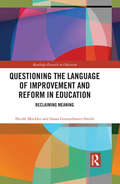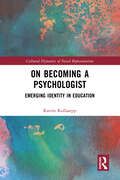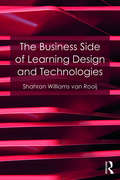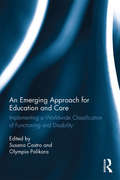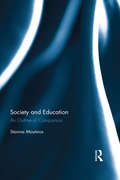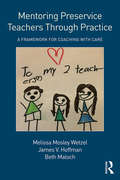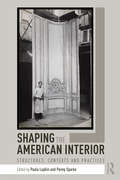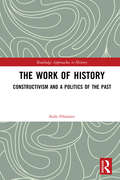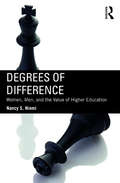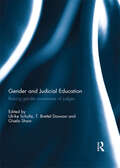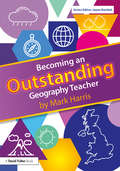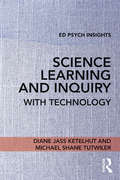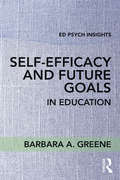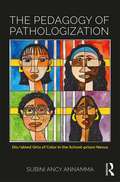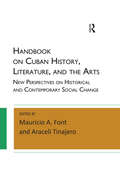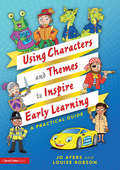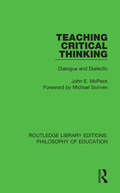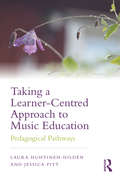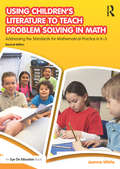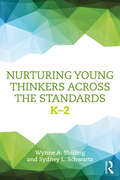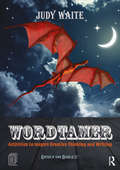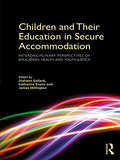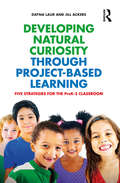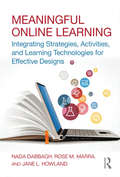- Table View
- List View
Questioning the Language of Improvement and Reform in Education: Reclaiming Meaning (Routledge Research in Education)
by Susan Groundwater-Smith Nicole MocklerQuestioning the Language of Improvement and Reform in Education challenges the language used in education by linking the language of both the public and professional domains with the changing intentions of the governance of education. Exploring various issues, which embody the many manifestations of the manner in which strident, conservative language has captured the public view of education, the book covers topics such as the importance of language in the context of educational practice, the media's portrayal of teachers globally, the role of students in the face of curriculum reform and the language used in educational policy worldwide. The book addresses the ways in which the words ‘improvement’ and ‘reform’ have been appropriated and hollowed-out by policymakers in order to justify globalised education policies. Using international case studies and reports, the authors argue that the employment of specific words masks the reality that new educational policies are regressive and require re-examination, while perpetuating the illusion that progressive educational practice is being brought to the fore. Questioning the Language of Improvement and Reform in Education is a fascinating and original take on this topic, which will be of great interest to educational practitioners, policymakers and linguists.
On Becoming a Psychologist: Emerging identity in education (Cultural Dynamics of Social Representation)
by Katrin KullaseppOn Becoming a Psychologist explores the professional identity construction of psychology students, examining their entry into the psychology profession from a socio-cultural perspective. The book brings together socio-cultural approaches and Dialogical Self Theory to gain comprehensive insight into the developmental processes behind the formation of professional identity. It conceptualises the process of becoming a psychologist as an intrapersonally and interpersonally unique semiotic process of self-regulation that unfolds through dialogical relations with the individual’s socio-cultural surroundings. Building on empirical research, the book outlines the results of a longitudinal study of a cohort of psychology students throughout their studies and following their graduation. The study sheds light on how professional role expectations are negotiated between the different aspects of the self, with a particular focus on how the self is positioned throughout the course of professional education. Offering a unique perspective on the socio-cultural construction of professional identity, this book will be of great interest to scholars, researchers and graduate students in the fields of cultural psychology, applied psychology and social psychology.
The Business Side of Learning Design and Technologies
by Shahron Williams van RooijThe Business Side of Learning Design and Technologies provides a ready reference with actionable tools and techniques for recognizing the impact of learning design/technology decisions at the project, business unit, and organizational levels. Written for early- and mid-career learning designers and developers as well as students and researchers in instructional/learning design and technology programs, this volume focuses on the business issues underlying the selection, design, implementation, and evaluation of learning opportunities. Using scholarly and practitioner research, interviews with Learning and Development thought leaders, and the author’s own experience, readers will learn how to speak the language of business to demonstrate the value of learning design and technologies.
An Emerging Approach for Education and Care: Implementing a Worldwide Classification of Functioning and Disability
by Susana Castro Olympia PalikaraAn Emerging Approach for Education and Care provides a synthesis of the extensive research that has been conducted worldwide about the International Classification of Functioning, Disability and Health for Children and Youth in education and care. The main purpose of the ICF is to provide a classification of functioning for adults and children with difficulties, considering their everyday lives, all the activities they perform and the environments they are embedded in, in addition to their health condition, which has been the traditional focus of Special Education provision in many countries. Each chapter presents an evidence-based study describing how the ICF has been used to improve the provision of services for children and young people with Special Educational Needs around the world. Moreover, each chapter is written by an expert on the ICF from a different country, thus providing an overview of how the ICF can be applied in international educational contexts with different educational and health systems and cultural backgrounds. This synthesis of world-leading research focuses on the ICF as a framework to approach assessment, intervention and classification for children and young people with SEN, whilst also providing practical examples of how it can be implemented. An Emerging Approach for Education and Care will be essential reading for academics, researchers and practitioners working on Special Educational Needs provision and rehabilitation. It should also be of great interest to those involved in the study of early childhood education, and for postgraduate students aspiring to work in these settings.
Society and Education: An Outline of Comparison
by Stavros MoutsiosSociety and Education explores the relation of society to education in Europe, as well as its comparative perspective towards overseas societies and their institutions. It is an enquiry into the social-historical institution of education and cross-cultural studies in Europe. Elaborating on the Castoriadian ontology, the book delves into the magma of social imaginary significations that characterise and associate pivotal epochs of the continent’s history, Classical Greece and Modernity, and exemplifies their incarnation in educational systems and in the formation of the European and, in general, the Western comparative gaze. With a particular focus on our epoch, Postmodernity and globalisation, the study traces the pervasive dominance of capitalist significations in social institutions, forms, and activities, as well as in education and the way it is compared across countries. Nevertheless, as Moutsios suggests, the European tradition, notwithstanding its ideological usage by much of social sciences, contains an indissoluble critical and self-reflective dimension, which needs to be sustained and advanced in education and its cross-cultural comparison, perhaps, more than ever before. The book demonstrates the embeddedness of education in its cultural context and should, therefore, be of great interest to academics, researchers and postgraduate students who are involved with comparative education, the sociology and history of education, education policy, and European studies.
Mentoring Preservice Teachers Through Practice: A Framework for Coaching with CARE
by James V. Hoffman Melissa Mosley Wetzel Beth MalochSupporting and challenging cooperating teachers to grow in their mentoring and coaching practices with preservice teachers and also in their own work as classroom teachers, this practical guide presents and illustrates the Coaching with CARE model—a framework for reflection and action that helps cultivate a perspective on teaching that puts students at the center of teacher preparation and places value on apprenticeship and participation in learning. The CARE model takes a turn away from traditional evaluation-based "training" approaches, offering a way for cooperating teachers, and facilitators and university teacher educators who work with them, to come together to shape innovative coaching and mentoring experiences for preservice teachers. Mentoring Preservice Teachers Through Practice, building on the authors’ own work with cooperating teachers, is based on the most recent research on learning to teach and supporting preservice teachers and grounded in the realities of teacher education today. Each chapter includes questions for discussion and suggested readings that can be used to explore the focus of the chapter more deeply as well as relevant research reports published by the authors.
Shaping the American Interior: Structures, Contexts and Practices
by Penny Sparke Paula LupkinBringing together 12 original essays, Shaping the American Interior maps out, for the first time, the development and definition of the field of interiors in the United States in the period from 1870 until 1960. Its interdisciplinary approach encompasses a broad range of people, contexts, and practices, revealing the design of the interior as a collaborative modern enterprise comprising art, design, manufacture, commerce, and identity construction. Rooted in the expansion of mass production and consumption in the last years of the nineteenth century, new and diverse structures came to define the field and provide formal and informal contexts for design work. Intertwined with, but distinct from, architecture and merchandising, interiors encompassed a diffuse range of individuals, institutions, and organizations engaged in the definition of identity, the development of expertise, and the promotion of consumption. This volume investigates the fluid pre-history of the American profession of interior design, charting attempts to commoditize taste, shape modern conceptions of gender and professionalism, define expertise and authority through principles and standards, marry art with industry and commerce, and shape mass culture in the United States.
The Work of History: Constructivism and a Politics of the Past (Routledge Approaches to History #22)
by Kalle PihlainenSince the appearance of Hayden White’s seminal work Metahistory in 1973, constructivist thought has been a key force within theory of history and has at times even provided inspiration for historians more generally. Despite the radical theoretical shift marked by constructivism and elaborated in detail by its proponents, confusion regarding many of its practical and ethical consequences persists, however, and its position on truth and meaning is routinely misconstrued. To remedy this situation, The Work of History seeks to mediate between constructivist theory and history practitioners’ intuitions about the nature of their work, especially as these relate to the so-called fact–fiction debate and to the literary challenges involved in the production of historical accounts. In doing so, the book also offers much-needed insight into debates about our experiential relations with the past, the political use of history and the role of facts in the contestation of power.
Degrees of Difference: Women, Men, and the Value of Higher Education
by Nancy S. NiemiThis volume investigates the dissonance between the supposed advantage held by educated women and their continued lack of economic and political power. Niemi explains the developments of the so-called "female advantage" and "boy crisis" in American higher education, setting them alongside socioeconomic and racial developments in women’s and men’s lives throughout the last 40 years. Exploring the relationship between higher education credentials and their utility in creating political, economic, and social success, Degrees of Difference identifies ways in which gender and academic achievement contribute to women’s and men’s power to shape their lives. This important book brings new light to the issues of power, gender identities, and the role of American higher education in creating gender equity.
Gender and Judicial Education: Raising Gender Awareness of Judges
by Ulrike Schultz, T. Brettel Dawson and Gisela ShawJudicial Education has greatly expanded in common law countries in the past 25 years. More recently it has become a core component in judicial reform programs in developing countries with gender attentiveness as an element required by donor agencies. In civil law jurisdictions judges´ schools have long played a role in the formation of the career judiciary with a focus on entry to the judicial profession, in some countries judges get an intensive in-service education at judicial academies. Gender questions, however, tend to be neglected in the curricula.These judicial education activities have generated a significant body of material and experience which it is timely to review and disseminate. Questions such as the following require answers. What is the current state of affairs? How is judicial education implemented in developed and developing countries all around the world? Who are the educators? Who is being educated? How is judicial education on gender regarded by judges? How effective are these programs?The chapters in this book deal with these questions. They provide a multiplicity of perspectives. Six countries are represented, of these four are civil law countries (Germany, Argentina, Japan, Bosnia and Herzegovina) and two are common law countries (Canada; Uganda). This book was previously published as a special issue of International Journal of the Legal Profession.
Becoming an Outstanding Geography Teacher (Becoming an Outstanding Teacher)
by Mark HarrisBecoming an Outstanding Geography Teacher supports all geography teachers in offering a wide range of approaches to teaching and learning that will stimulate and engage students. Providing a variety of techniques for planning inspiring geography lessons, the book shows teachers how they can use current resources in a more innovative way to produce outstanding results. Chapters include sample lesson plans which demonstrate each technique with a step-by-step discussion of the development of the lessons, and have a strong focus on activating learning and supporting pupils on their individual learning journeys. The book covers all aspects of geography teaching, including: designing programmes of study differentiation questioning literacy and numeracy teaching A Level enquiry geography feedback and assessment. Packed full of strategies and activities that are easy to implement, Becoming an Outstanding Geography Teacher is essential reading for newly qualified and experienced geography teachers who want to ensure outstanding teaching and learning in their classrooms.
Science Learning and Inquiry with Technology (Ed Psych Insights)
by Diane Jass Ketelhut Michael Shane TutwilerWhen implemented effectively, technology has great potential to positively connect with learning, assessment, and motivation in the context of K–12 science education and inquiry. Written by leading experts on technology-enhanced science learning and educational research, this book situates the topic within the broader context of educational psychology research and theory and brings it to a wider audience. With chapters on the fundamentals of science learning and assessment, integration of technology into classrooms, and examples of specific technologies, this concise volume is designed for any course on science learning that includes technology use in the curriculum. It will be indispensable for student researchers and both pre- and in-service teachers alike.
Self-Efficacy and Future Goals in Education (Ed Psych Insights)
by Barbara A. GreeneAs the inner resource that drives us to pursue activities, to put forth effort, and to avoid failure, motivation is key to overall well-being. Self-efficacy and future goals are important to understanding and reinforcing the motivation to learn, especially for students in classroom settings. Written by a leading expert on motivation, this book situates the topic within the broader context of educational psychology research and theory, and brings it to a wider audience. With chapters on the fundamentals of self-efficacy and future goals, their importance for student learning, and how to develop them in educational settings, this concise volume is designed for any education course that includes student motivation in the curriculum. It will be indispensible for student researchers and both pre- and in-service teachers alike.
The Pedagogy of Pathologization: Dis/abled Girls of Color in the School-prison Nexus
by Subini Ancy AnnammaWINNER OF THE 2018 NATIONAL WOMEN'S STUDIES ASSOCIATION ALISON PIEPMEIER BOOK PRIZE Linking powerful first-person narratives with structural analysis, The Pedagogy of Pathologization explores the construction of criminal identities in schools via the intersections of race, disability, and gender. amid the prevalence of targeted mass incarceration. Focusing uniquely on the pathologization of female students of color, whose voices are frequently engulfed by labels of deviance and disability, a distinct and underrepresented experience of the school-to-prison pipeline is detailed through original qualitative methods rooted in authentic narratives. The book’s DisCrit framework, grounded in interdisciplinary research, draws on scholarship from critical race theory, disability studies, education, women’s and girl’s studies, legal studies, and more.
Handbook on Cuban History, Literature, and the Arts: New Perspectives on Historical and Contemporary Social Change
by Araceli Tinajero Mauricio A. FontFirst Published in 2016. Routledge is an imprint of Taylor & Francis, an Informa company.
Using Characters and Themes to Inspire Early Learning: A Practical Guide
by Jo Ayers Louise RobsonOffering an approach that is tried, tested and proven to work, this book supports practitioners in planning and resourcing a series of topics based around popular themes and interests in the early years. Each topic is open-ended and introduced in the form of a problem that the children have to solve and can be led by their knowledge, thoughts and ideas. Using Characters and Themes to Inspire Early Learning aims to nurture children’s natural curiosity and imagination, encouraging them to become the facilitators who are empowered to solve problems, explore solutions and take ownership of their learning. There are links throughout to the seven areas of learning in the EYFS and practical guidance on how to document the children’s learning. Features include: An exciting range of characters, themes and objects to inspire children. Photocopiable pages and online resources to use in the classroom. Session breakdowns to set the scene and make planning easy. Creative ideas and activities to prompt children’s thinking and develop discussions. Packed with ideas for extending learning and practical resources that can be printed out for use in the classroom, this book is essential reading for all students and practitioners who want to provide inspiring learning opportunities for the children in their care.
Teaching Critical Thinking: Dialogue and Dialectic (Routledge Library Editions: Philosophy of Education #13)
by John E. McPeckThis book, first published in 1990, takes a critical look at the major assumptions which support critical thinking programs and discovers many unresolved questions which threaten their viability. John McPeck argues that some of these assumptions are incoherent or run counter to common sense, while others are unsupported by the available empirical evidence. This title will be of interest to students of the philosophy of education.
Taking a Learner-Centred Approach to Music Education: Pedagogical Pathways
by Laura Huhtinen-Hildén Jessica PittAdopting a fresh approach to the assumptions and concepts which underlie musical learning, Taking a Learner-Centred Approach to Music Education provides comprehensive guidance on professional and pedagogical aspects of learner-centred practice. This essential companion offers a pedagogy which is at once informed by theoretical understandings, and is underpinned by experience, practical examples, case studies and self-reflection. Initial chapters explore the theoretical dimensions of learner-centred music education, touching on aspects including collaborative learning, the learning environment and pedagogical sensitivity. Latter chapters delve deeper into the practical application of these teaching strategies and methods. The book invites its reader to reflect on topics including: music, emotions and interaction the voice and body as instruments making music visible and tangible improvising and learning music with instruments working with groups in creative activities the music pedagogue as a sensitive and creative instrument. Taking a Learner-Centred Approach to Music Education will deepen understanding, facilitate reflection and inspire new approaches to teaching in the field of music. It is essential reading for current and future practitioners involved in music education, early childhood music practice, community music, music therapy and special needs education.
Using Children's Literature to Teach Problem Solving in Math: Addressing the Standards for Mathematical Practice in K–5
by Jeanne WhiteLearn how children’s literature can help K–5 students see the real-life applications of mathematical concepts. This user-friendly book shows how to use stories to engage students in building critical reasoning, abstract thinking, and communication skills, all while helping students understand the relevance of math in their everyday lives. Each chapter is dedicated to one of the eight Standards for Mathematical Practice, and offers examples of children’s literature that can be used to help students develop that practice. You’ll find out how to: Encourage students to persevere in solving mathematical problems and use multiple approaches to find the answer; Help students reason abstractly with the aid of concrete objects and visuals; Guide students in constructing arguments to explain their reasoning and engage in critical discussion with their peers; Teach students to recognize mathematical patterns and use them to solve problems efficiently; And more! The book offers activities for beginners as well as for more advanced problem solvers. Each chapter also provides guidance for ELLs and students with special needs, so no matter your classroom environment, you’ll be able to use these strategies to make math class more dynamic, engaging, and fun.
Nurturing Young Thinkers Across the Standards: K–2
by Wynne A. Shilling Sydney L. SchwartzNurturing Young Thinkers Across the Standards: K–2 provides multiple practical resources to assist teachers in working with standards across subject areas in ways that bring critical thinking into the everyday process of learning content and skills. The authors provide suggestions for engaging and sustaining children’s interest and illustrate the use of teaching language that actively nurtures the habits of lifelong learning. The book is rich with opportunities for developing tools for design, implementation, and assessment of vibrant integrated curricula for K–2 students that support the development of cognitive skills and increase confidence in their abilities to think and learn.
Wordtamer: Activities to Inspire Creative Thinking and Writing
by Judy WaiteImagine a funfair in the classroom... invite dragons to school…let pupils travel through time! Written by award-winning children’s author Judy Waite, Wordtamer offers over fifty ideas for exciting, innovative writing activities and creative workshops. The book explores how authors actually work and what they achieve through their methods. It considers how teachers and children can incorporate these techniques into their own work, and so improve creative writing. Wordtamer provides easy-to-follow instructions to: set up and run inspiring writing lessons and workshops cover basic elements such as character and setting identify craft skills that link writing with the school curriculum develop ideas into contemporary, science fiction, fantasy or time-travel scenarios using tried-and-tested templates that expand on core concepts engage reluctant writers by using visual and kinaesthetic approaches develop independent and group-work practice enrich creative practice and awareness explore different writing styles improve teaching styles and children’s writing through a range of innovative and interactive activities appreciate why, as well as how, these techniques are so effective. Underpinned by theory and Judy’s own experience of working as an author in schools and running writing workshops for all ages, Wordtamer offers step-by-step, inspiring plans for creative writing lessons that will make a buzz in the classroom. Pupils won’t just create characters…they will become them.
Students, Places and Identities in English and the Arts: Creative Spaces in Education (National Association for the Teaching of English (NATE))
by David Stevens Karen LockneyIn an age when national identities are a subject of popular debate, along with issues of place in relation to immigration, displacement and mobility, it is particularly important that educators are supported in their reflections on how best to respond to such pertinent issues in their daily practice. This book accessibly and sensitively explores the ways in which teachers can work with places and identities in English and related expressive arts to create a rich experience for students in schools and beyond. A team of carefully selected contributors present practical ideas and critically examine diverse contexts and viewpoints. Exploring the significance of identity and place in education, the central notion is that language and arts are vital to enhancing understanding and empathy. The book provides an approach that offers teachers and other professionals ways to engage critically with these themes, as well as practical strategies for opening up debate and creative work in a broad range of curriculum areas. This insightful book will be of interest to teachers, teacher educators, training teachers and researchers in education.
Children and Their Education in Secure Accommodation: Interdisciplinary Perspectives of Education, Health and Youth Justice
by Diahann Gallard Katharine Evans James MillingtonThis highly topical book integrates theory and practice about children and their education provision in secure accommodation. Bridging the fields of education, health, and youth justice, it provides a unique interdisciplinary perspective outlining the importance of taking a holistic approach to the education and rehabilitation of children who are ‘locked up’. The book has brought together contributors from across the UK and beyond to share their academic research, practical knowledge, and experiences working with children and young people. Shedding light on the intricacies and realities of working in the context of secure settings, the book is divided into the following five parts: Contextualising the field Practice insights Case examples and models of practice Inclusion and voice Recommendations from research Children and Their Education in Secure Accommodation unravels the complexity of the topic and offers ‘whole-system’ perspectives, as well as a child-centred view, on the issue of educating and rehabilitating children and the needs and rights of children in such settings. With unique and valuable insights from those involved in policy or provision, this book will be an essential text for researchers, practitioners, and students in this interdisciplinary field.
Developing Natural Curiosity through Project-Based Learning: Five Strategies for the PreK–3 Classroom
by Dayna Laur Jill AckersDeveloping Natural Curiosity through Project-Based Learning is a practical guide that provides step-by-step instructions for PreK–3 teachers interested in embedding project-based learning (PBL) into their daily classroom routine. The book spells out the five steps teachers can use to create authentic PBL challenges for their learners and illustrates exactly what that looks like in an early childhood classroom. Authentic project-based learning experiences engage children in the mastery of twenty-first-century skills and state standards to empower them as learners, making an understanding of PBL vital for PreK–3 teachers everywhere.
Meaningful Online Learning: Integrating Strategies, Activities, and Learning Technologies for Effective Designs
by Nada Dabbagh Jane L. Howland Rose M. MarraMeaningful Online Learning explores the design and facilitation of high-quality online learning experiences and outcomes through the integration of theory-based instructional strategies, learning activities, and proven educational technologies. Building on the authors’ years of synthesized research and expertise, this textbook prepares instructors in training to create, deliver, and evaluate learner-centered online pedagogies. Pre- and in-service K–12 teachers, higher education faculty, and instructional designers in private, corporate, or government settings will find a comprehensive approach and support system for their design efforts.
